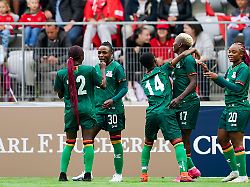Assaults, insults, malice
The difficult road for Africa’s women footballers
7/6/2023, 7:43 p.m
Women’s football in Africa is massively underfunded and the training conditions are bad. If you want to be a footballer in Africa, you have to have more than just a love for the sport. Despite this, four African teams have qualified for the World Cup for the first time.
It doesn’t get any bigger in Zambia: Shortly before the start of the Women’s World Cup in Australia and New Zealand, Zambia’s soccer players train in the National Heroes Stadium – no stadium in the South African country can accommodate more people than the 60,000-seat national stadium. The atmosphere among the players is exuberant. They usually have to train in conditions that are far from comparable: poorly maintained pitches, underdeveloped locker rooms and a lack of medical staff are the norm at many players’ home clubs.
It is often the case that the better-quality training grounds are mainly reserved for the men’s teams, says midfielder Evarine Katongo. “We women get less time to train and have to make room for the men,” she says. But despite all the challenges, the “Copper Queens”, as the team from the copper-rich country is called, qualified for the World Cup for the first time. For their last test match, they will make a detour to Germany, where they will play on Friday (8.30 p.m./ARD and in the ntv.de live ticker) meet the vice European champions.
Transfer to Europe as a way out
There are also three other teams from Africa: South Africa, Nigeria and Morocco. They could become ambassadors for a sport that is still not appreciated in Africa. Because if you want to be a footballer in Africa, you have to have more than just a love for the sport. The clubs in the first Zambian women’s league are often completely underfunded. There are hardly any sponsors. The athletes either earn a salary that is more like a tip, or often nothing at all. At the end of the month, Zambia’s “Copper Queens” will take home the equivalent of almost 50 euros, several players explain during training. If they win a league game, a bonus of 5 euros to 15 euros will be paid out. “The money is not enough to feed the family,” says one of the professional footballers, who wishes to remain anonymous. The only way out is to be lured away to other European countries.
The country is now in such dire need that three clubs – the Green Buffaloes, Nkwazi and Red Arrows – have found an unorthodox solution to retaining their players. They have joined forces with the Zambian army. The army sponsors the clubs and also offers the players jobs in the military. Of the 35 players who made it into the world champion squad alone, ten are employed by the Zambian army.
Football is considered a purely male sport
In other African countries, too, the status of women’s football remains low. No matter where you look, the problems are similar: a lack of sponsors, a lack of infrastructure, poor wages and underfunding. Gender discrimination in sport remains ingrained and tolerated in most parts of Africa, writes Nigerian sports journalist Emmanuel Chinaza in an editorial. “Football is still seen as a purely male sport.” Chinaza said it’s time that female professional footballers were treated just like their male counterparts, whether it’s public image, training conditions or pay. He hopes that women’s football will help challenge gender norms on and off the pitch.
Last July, Nigerian women’s team Super Falcons held a protest in training during the Women’s Africa Cup of Nations in Morocco in protest of wage arrears. Ghana’s women’s league received a viable sponsorship deal for the first time in its history in August. Former South Africa captain Janine van Wyk, who is considered one of the continent’s best footballers, lamented in local newspaper The Continent that much must change before African women’s footballers can reach their true potential. “The gap between [den Bedingungen] in African football and the rest of the world is huge. We still have a long way to go,” said van Wyk.
The fact that the South Africans are actually traveling to Down Under was only clarified shortly before. Sportingly qualified, the national players even boycotted an international match in a dispute with their association. The dispute was mainly about bonuses – for the first time each participant receives at least 30,000 dollars from the world association FIFA, contrary to the demands of the players South Africa’s association did not want to increase the amount. Ultimately, Patrice Motsepe, President of the African association CAF, is now making the necessary funds available through his foundation.
Sexual assaults by coaches
But not only equipment and salaries are a problem. A scandal erupted in Zambia last year when reports circulated on social media of coaches allegedly sexually assaulting players. Those who resisted were later disadvantaged. These allegations were not really worked up. Zambia coach Bruce Mwape said only that each team member had been selected on merit. Those dropped from the squad would not have met the requirements. There were similar scandals in Gabon and Sierra Leone last year alone.
Actually, there is plenty of talent in Africa and also individual success stories, such as Nigerian Asisat Oshoala, who plays for FC Barcelona Femení, Ghanaian Evelyn Badu, who was hired by Norwegian club Avaldsnes IL, or South African Noko Matlou, who plays for Spanish club SD Eibar.
However, statements such as those by the President of Tanzania, Samia Suluhu Hassan, make it clear how far the road is for women in soccer in Africa. Two years ago, she made snide remarks about the “manly” looks of female footballers. Because of their “flat breasts,” the players are unattractive and have no chance of marriage, Hassan said. So there is still a lot to be done before fundamental respect for African women footballers is a matter of course.
